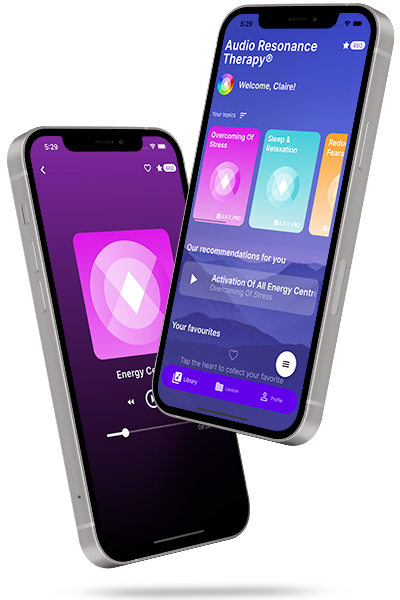Sound stimulations for improved focussing
With the help of specially designed binaural sound stimulations, coupled with suitable meditative exercises, we will try to support you to strengthen your ability to concentrate.
What are binaural beats?
We use for these A.R.T. Track the physical principle of “binaural beats”. These arise when certain different frequencies are played on the left and right ear. If this feed follows certain rules, the human brain forms a pseudo-frequency in compensating the difference between the individual signals. Today this method of binaural stimulation is a scientifically based method of sound therapy to promote concentration, learning and relaxation.
You should listen to the tracks of the A.R.T. focus module with headphones in order to be able to perceive the binaural effect. Note: If you suffer from neurological diseases such as epilepsy, please ask your doctor first whether the tracks can be used without any problems.
The A.R.T. sound stimulations for improved focussing activate different energy centers of the body
Lack of concentration / ADHD
Your thoughts keep wandering and you find it difficult to concentrate on one topic? Are you often distracted and have you forgotten the exact content shortly after a conversation? Concentration problems can affect anyone, regardless of age.
Possible causes for concentration disorders
There are many triggers for concentration disorders, for example an unfavorable lifestyle with lack of sleep, one-sided diet and excessive consumption of junk food. In addition, many other external and internal influences can reduce the ability to concentrate. Last but not least, certain underlying diseases can be associated with concentration problems.
External factors: noise, lack of oxygen, weather (e.g. heat), time pressure, medication, alcohol or drug abuse.
Internal factors: tendency to concentrate unsuccessfully, lack of self-discipline, stress and worries, depression.
Physical factors: lack of fluids, malnutrition, lack of nutrients (e.g. iron, B vitamins), low blood pressure, withdrawal symptoms (e.g. withdrawal from alcohol).
Possible underlying diseases: hypothyroidism, heart disease, attention deficit hyperactivity syndrome (ADHD), Parkinson’s / dementia / MS, circulatory disorders in the brain, mental disorders (depression, psychoses).
Typical symptoms of concentration problems are for example: Increased distraction, wandering of thoughts, absent-mindedness, forgetfulness.
Possible accompanying symptoms of a lack of concentration can include, for example, fatigue, nervousness, decreased performance, sleep disorders, memory disorders and exhaustion.

WHAT OUR USERS SAY



